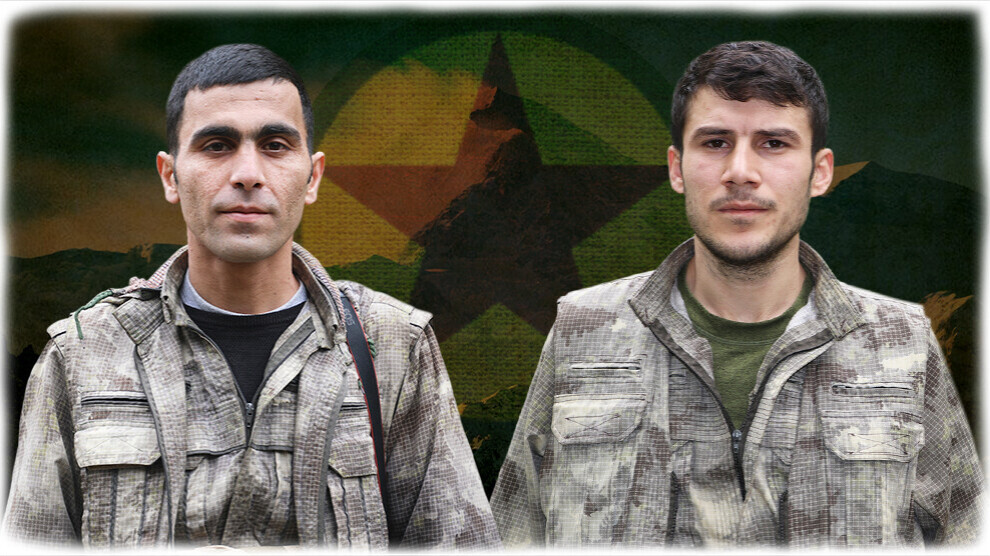HPG pays tribute to guerrillas Zerdeşt Suruç and Rêbaz Bagok
Guerrillas Zerdeşt Suruç and Rêbaz Bagok were killed in attacks by the Turkish army on the Bagok Mountain in Mardin.
Guerrillas Zerdeşt Suruç and Rêbaz Bagok were killed in attacks by the Turkish army on the Bagok Mountain in Mardin.

The Press Center of the People's Defense Forces (HPG) has published the identities of two fallen guerrillas.
According to the information, guerrillas Zerdeşt Suruç and Rêbaz Bagok were killed on 30 August on the Bagok massif in the province of Mardin (Mêrdîn). After clashes with the enemy, the area was bombed several times by Turkish fighter jets and attack helicopters.
The HPG paid tribute to the two fallen guerrillas, saying that they were self-sacrificing and courageous militants who fought for the freedom of their people until their last breath. "Our comrades Zerdeşt and Rêbaz dedicated their entire lives to this fight. We give our word that we will continue their path without hesitation and keep their memory alive," said the HPG.
The HPG expressed condolences to the relatives, the people of Urfa (Riha) and Mardin and the entire Kurdish people.
The following information was given about the identity of the martyrs:
 Code name: Zerdeşt Suruç
Code name: Zerdeşt Suruç
First and last name: Adem Özkan
Place of birth: Riha
Names of mother and father: Yazı - Hasan
Date and place of death: August 30, 2024 / Mêrdîn
 Code name: Rêbaz Bagok
Code name: Rêbaz Bagok
First and last name: Selman Dağdelen
Place of birth: Mêrdîn
Names of mother and father: Hayriye - Hasan
Date and place of death: August 30, 2024 / Mêrdîn
Zerdeşt Suruç
Zerdeşt Suruç was born in Urfa-Suruç (Riha-Pirsûs). His childhood was shaped by the war in Kurdistan, and he was not allowed to speak his native language, Kurmancî, at school.
In 2013, he joined a guerrilla group in North Kurdistan. The decisive factors in his decision were the Roboskî massacre (on 28 December 2011) and the murder of Sakine Cansız, Fidan Doğan and Leyla Şaylemez on 9 January 2013 in Paris by the Turkish Secret Service.
Zerdeşt Suruç took part in basic training for new fighters in the Medya Defense Areas and used every minute to understand and implement Abdullah Öcalan's liberation paradigm in all its facets. After military training, he went into practice and fought against ISIS in various areas. He was wounded during this battle; after short treatment, he returned to the front and continued to take part in the liberation offensives.
When he had fulfilled his mission in the fight against ISIS, he returned to the Medya Defense Areas and took on important tasks. For one assignment, he had to cross the border, and in the process came into contact with the enemy. Because he did not want to be captured by the enemy, he fired his last bullet at himself.
He survived and was captured injured. During his imprisonment, he did not let himself be broken and maintained his revolutionary attitude. When he was released from prison, he continued his struggle in various places in Kurdistan. After further training, he went to Bakur (North Kurdistan) as an ideologically and militarily experienced militant and finally fought under difficult conditions in Mardin.
Rêbaz Bagok
Rêbaz Bagok was born in Mardin-Nusaybin (Mêrdîn-Nisêbîn) and grew up in an environment close to the PKK. As a child, he dreamed of becoming a guerrilla. As an adolescent, he became active in the Kurdish youth movement, and in 2014, impressed by the resistance in Kobanê against ISIS, he joined the guerrillas.
He undertook basic training in the Zap region and was happy to become part of a collective fight for freedom. During his subsequent practice in the Zap, he quickly gained experience in guerrilla warfare and took part in various successful actions against the Turkish army.
In order to develop further ideologically, militarily and personally, after a long period of practice, he went to an academy for further training, where he questioned his involvement in the fight and deepened his knowledge of the new guerrilla tactics. In the face of massive attacks on the Kurdish freedom movement, he came to the realization that extraordinary times require extraordinary personalities.
He was determined and ready to make any sacrifice to live up to his responsibility towards his people and his fallen comrades. At his own request, he returned to his native region of Mardin and helped organize important activities. In doing so, he developed his own methods and remained sincerely committed to his goals until the end.